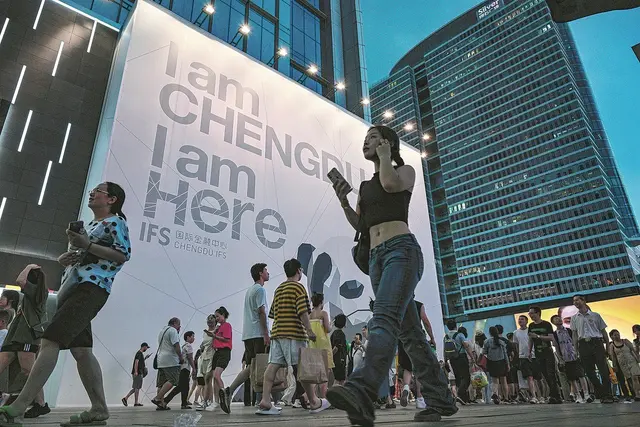By HUANG ZHILING in Chengdu
Wang Kehao, a 31-year-old deliveryman in Chengdu, Sichuan province, is impressed with the major face-lift given to his city through preparations for the Chengdu FISU World University Games, which started on Friday.
"Every day, I go from street to street to deliver food, and I see changes in the urban environment and improvements in public transportation. People have enjoyed the benefits of these changes," he said.
Chengdu's makeover has impressed its 21 million residents, as well as International University Sports Federation officials and athletes participating in the games, which had been delayed twice due to the COVID-19 pandemic.
The city built 13 venues and renovated 36 existing ones for the games. All the facilities, including the Dong'an Lake Sports Park where the opening ceremony was held on Friday evening, were put into use by early 2021.
When the Chengdu FISU World University Games Village opened on July 22, Eric Saintrond, FISU secretary-general and CEO, said it is "one of the best we've ever had" and lauded its opening ceremony.
Located on Chengdu University's campus, the 800,000-square-meter village is equipped with living, leisure, fitness, and science and technology facilities. A wealth of activities have been organized for the athletes to help them learn about traditional Chinese and local cultures.
According to Xian Rongsheng, the village head, the athletes can enjoy various types of foods from around the world. The village is also equipped with self-driving buses, a new intelligent translation system and other technological facilities.
Saintrond said he was impressed by many aspects of the games, such as the close proximity of all service areas, the well-functioning transportation networks and well-equipped facilities.
"After two years of postponement, athletes from all over the world will gather in Chengdu to compete and explore the future together. The village's opening is a symbolic moment," Saintrond said.
"We know the great efforts the organizing committee, the Chinese authorities and thousands of volunteers have put in to make this possible. This village will be one of the greatest legacies of the Chengdu FISU Games," he said.
Chengdu, which was designated as one of China's first batch of 24 historically and culturally significant cities in 1982, has much to offer the visiting athletes, who have been encouraged to take time to get to know each other.
"Chengdu has provided excellent support for athletes to compete. The rich activities have promoted cultural exchanges between athletes from different countries. It will be a wonderful sporting and cultural event," said Hannah Schafer, event coordinator of the German University Sports Federation.
In anticipation of the games, Chengdu has staged colorful events for visitors.
The Chengdu Du Fu Thatched Cottage Museum — where Du Fu (712-770), one of China's most revered poets, lived for nearly four years and penned 240 of his 1,455 extant poems — is holding an orchid exhibition that began on March 3 and will run through Oct 30. More than 1,000 pots of orchids will be on display, according to Chen Tao, an information officer at the museum.
The Temple of Marquis Wu — which is dedicated to Zhuge Liang (181-234), a legendary premier and strategist of the Shu Kingdom (221-263) during the Three Kingdoms period (220-280) who now serves as a symbol of loyalty and wisdom in China — is holding a three-month opera art exhibition that began on Wednesday, bringing together more than 100 pieces and sets of opera relics from museums and memorial halls across the country, including the Palace Museum in Beijing.
The exhibition includes costumes worn by famous actors who have portrayed characters from the Three Kingdoms, according to Xie Jiaqian, an information officer at the temple.
And the Jinsha Site Museum is holding Southwest China's largest bronzeware exhibition. The show, which began on May 27 and will run through Aug 27, has brought together 294 cultural relics from the Neolithic Age to the Han Dynasty (206 BC-AD 220). They come from 32 cultural institutions in Yunnan, Guizhou and Sichuan provinces, the Guangxi Zhuang autonomous region and Chongqing municipality.
(CHINADAILY)
 简体中文
简体中文

